HC1031: Analyzing Coles' Management Principles and Bureaucracy
VerifiedAdded on 2021/06/05
|10
|3683
|107
Report
AI Summary
This report provides a detailed analysis of the management principles and organizational structure of Coles, a major supermarket chain in Australia. It begins by examining the application of Henry Fayol's 14 principles of management, such as authority and responsibility, unity of direction, remuneration for personnel, and equity, demonstrating how Coles integrates these principles into its operations, supported by financial and sustainability reports. The report then assesses the fit of Coles within Max Weber's ideal bureaucracy model, highlighting areas where the company aligns with the model's components, such as division of labor and hierarchical structure, while also noting deviations, such as the involvement of managers in shareholding. Finally, the report explores the evolution of management theories within Coles, including the adoption of contingency theory and neo-classical theory, providing insights into the company's adaptation of management styles over time. The analysis utilizes the provided resources of the company to justify the use of management principles.
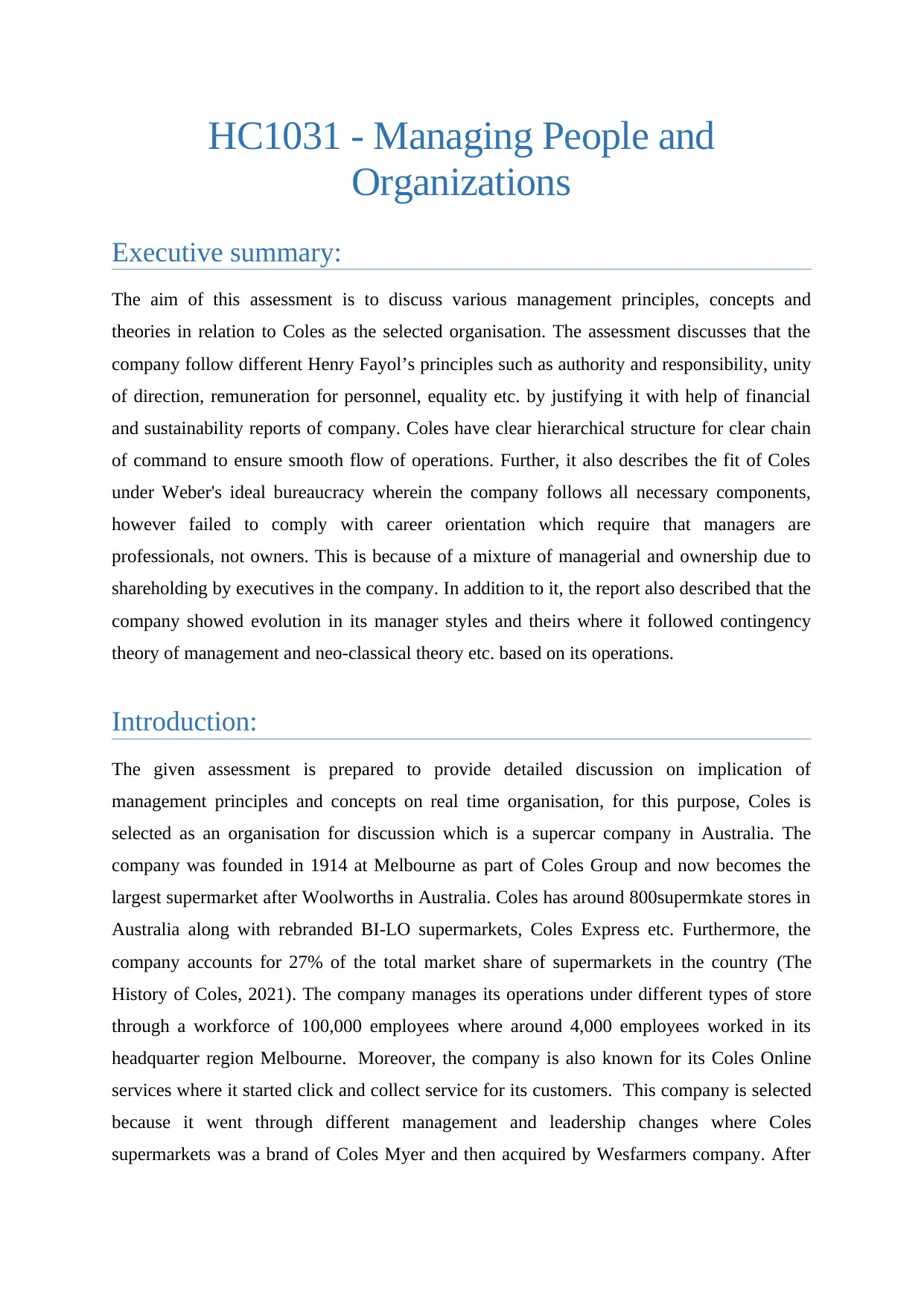
HC1031 - Managing People and
Organizations
Executive summary:
The aim of this assessment is to discuss various management principles, concepts and
theories in relation to Coles as the selected organisation. The assessment discusses that the
company follow different Henry Fayol’s principles such as authority and responsibility, unity
of direction, remuneration for personnel, equality etc. by justifying it with help of financial
and sustainability reports of company. Coles have clear hierarchical structure for clear chain
of command to ensure smooth flow of operations. Further, it also describes the fit of Coles
under Weber's ideal bureaucracy wherein the company follows all necessary components,
however failed to comply with career orientation which require that managers are
professionals, not owners. This is because of a mixture of managerial and ownership due to
shareholding by executives in the company. In addition to it, the report also described that the
company showed evolution in its manager styles and theirs where it followed contingency
theory of management and neo-classical theory etc. based on its operations.
Introduction:
The given assessment is prepared to provide detailed discussion on implication of
management principles and concepts on real time organisation, for this purpose, Coles is
selected as an organisation for discussion which is a supercar company in Australia. The
company was founded in 1914 at Melbourne as part of Coles Group and now becomes the
largest supermarket after Woolworths in Australia. Coles has around 800supermkate stores in
Australia along with rebranded BI-LO supermarkets, Coles Express etc. Furthermore, the
company accounts for 27% of the total market share of supermarkets in the country (The
History of Coles, 2021). The company manages its operations under different types of store
through a workforce of 100,000 employees where around 4,000 employees worked in its
headquarter region Melbourne. Moreover, the company is also known for its Coles Online
services where it started click and collect service for its customers. This company is selected
because it went through different management and leadership changes where Coles
supermarkets was a brand of Coles Myer and then acquired by Wesfarmers company. After
Organizations
Executive summary:
The aim of this assessment is to discuss various management principles, concepts and
theories in relation to Coles as the selected organisation. The assessment discusses that the
company follow different Henry Fayol’s principles such as authority and responsibility, unity
of direction, remuneration for personnel, equality etc. by justifying it with help of financial
and sustainability reports of company. Coles have clear hierarchical structure for clear chain
of command to ensure smooth flow of operations. Further, it also describes the fit of Coles
under Weber's ideal bureaucracy wherein the company follows all necessary components,
however failed to comply with career orientation which require that managers are
professionals, not owners. This is because of a mixture of managerial and ownership due to
shareholding by executives in the company. In addition to it, the report also described that the
company showed evolution in its manager styles and theirs where it followed contingency
theory of management and neo-classical theory etc. based on its operations.
Introduction:
The given assessment is prepared to provide detailed discussion on implication of
management principles and concepts on real time organisation, for this purpose, Coles is
selected as an organisation for discussion which is a supercar company in Australia. The
company was founded in 1914 at Melbourne as part of Coles Group and now becomes the
largest supermarket after Woolworths in Australia. Coles has around 800supermkate stores in
Australia along with rebranded BI-LO supermarkets, Coles Express etc. Furthermore, the
company accounts for 27% of the total market share of supermarkets in the country (The
History of Coles, 2021). The company manages its operations under different types of store
through a workforce of 100,000 employees where around 4,000 employees worked in its
headquarter region Melbourne. Moreover, the company is also known for its Coles Online
services where it started click and collect service for its customers. This company is selected
because it went through different management and leadership changes where Coles
supermarkets was a brand of Coles Myer and then acquired by Wesfarmers company. After
Paraphrase This Document
Need a fresh take? Get an instant paraphrase of this document with our AI Paraphraser
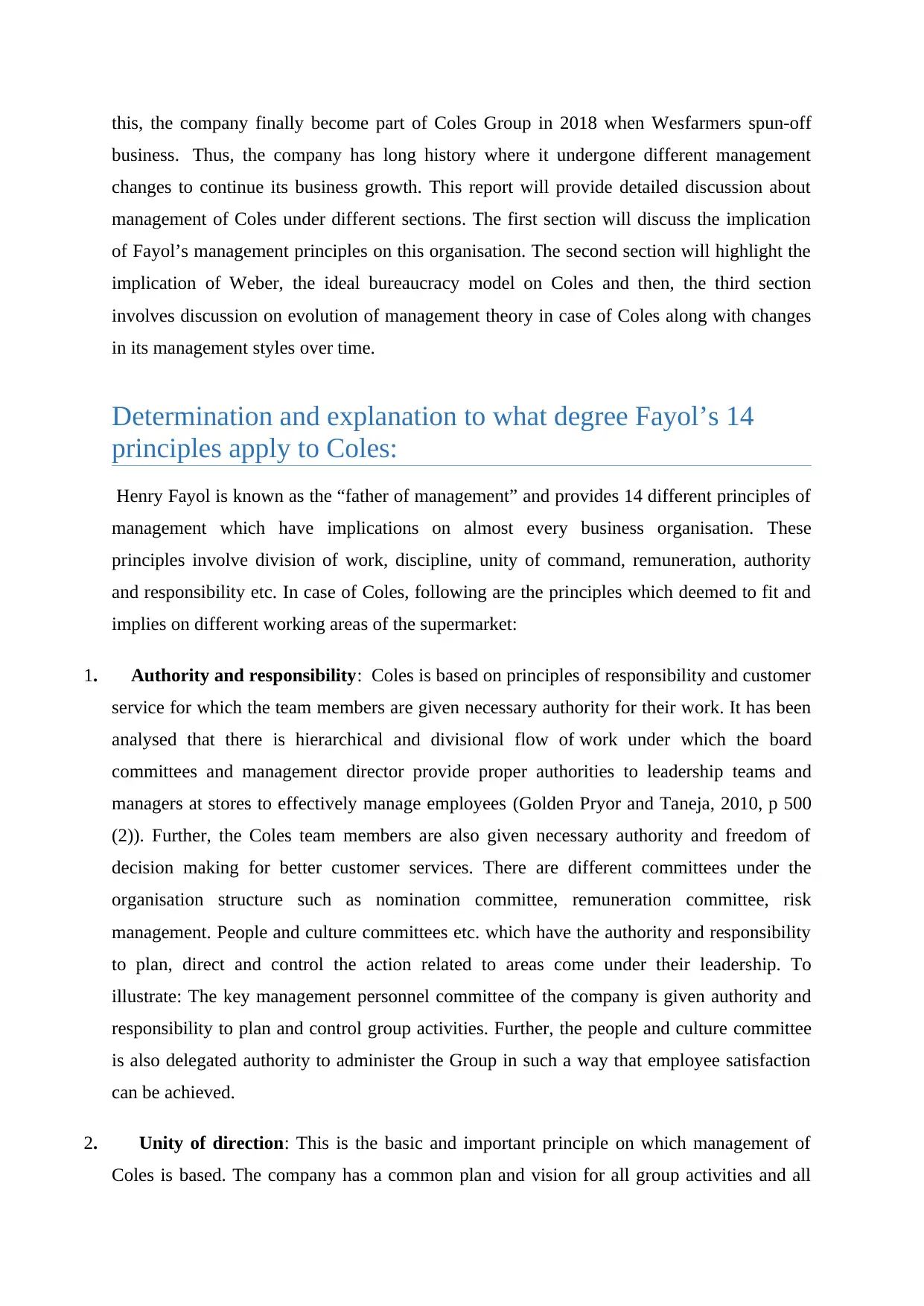
this, the company finally become part of Coles Group in 2018 when Wesfarmers spun-off
business. Thus, the company has long history where it undergone different management
changes to continue its business growth. This report will provide detailed discussion about
management of Coles under different sections. The first section will discuss the implication
of Fayol’s management principles on this organisation. The second section will highlight the
implication of Weber, the ideal bureaucracy model on Coles and then, the third section
involves discussion on evolution of management theory in case of Coles along with changes
in its management styles over time.
Determination and explanation to what degree Fayol’s 14
principles apply to Coles:
Henry Fayol is known as the “father of management” and provides 14 different principles of
management which have implications on almost every business organisation. These
principles involve division of work, discipline, unity of command, remuneration, authority
and responsibility etc. In case of Coles, following are the principles which deemed to fit and
implies on different working areas of the supermarket:
1. Authority and responsibility: Coles is based on principles of responsibility and customer
service for which the team members are given necessary authority for their work. It has been
analysed that there is hierarchical and divisional flow of work under which the board
committees and management director provide proper authorities to leadership teams and
managers at stores to effectively manage employees (Golden Pryor and Taneja, 2010, p 500
(2)). Further, the Coles team members are also given necessary authority and freedom of
decision making for better customer services. There are different committees under the
organisation structure such as nomination committee, remuneration committee, risk
management. People and culture committees etc. which have the authority and responsibility
to plan, direct and control the action related to areas come under their leadership. To
illustrate: The key management personnel committee of the company is given authority and
responsibility to plan and control group activities. Further, the people and culture committee
is also delegated authority to administer the Group in such a way that employee satisfaction
can be achieved.
2. Unity of direction: This is the basic and important principle on which management of
Coles is based. The company has a common plan and vision for all group activities and all
business. Thus, the company has long history where it undergone different management
changes to continue its business growth. This report will provide detailed discussion about
management of Coles under different sections. The first section will discuss the implication
of Fayol’s management principles on this organisation. The second section will highlight the
implication of Weber, the ideal bureaucracy model on Coles and then, the third section
involves discussion on evolution of management theory in case of Coles along with changes
in its management styles over time.
Determination and explanation to what degree Fayol’s 14
principles apply to Coles:
Henry Fayol is known as the “father of management” and provides 14 different principles of
management which have implications on almost every business organisation. These
principles involve division of work, discipline, unity of command, remuneration, authority
and responsibility etc. In case of Coles, following are the principles which deemed to fit and
implies on different working areas of the supermarket:
1. Authority and responsibility: Coles is based on principles of responsibility and customer
service for which the team members are given necessary authority for their work. It has been
analysed that there is hierarchical and divisional flow of work under which the board
committees and management director provide proper authorities to leadership teams and
managers at stores to effectively manage employees (Golden Pryor and Taneja, 2010, p 500
(2)). Further, the Coles team members are also given necessary authority and freedom of
decision making for better customer services. There are different committees under the
organisation structure such as nomination committee, remuneration committee, risk
management. People and culture committees etc. which have the authority and responsibility
to plan, direct and control the action related to areas come under their leadership. To
illustrate: The key management personnel committee of the company is given authority and
responsibility to plan and control group activities. Further, the people and culture committee
is also delegated authority to administer the Group in such a way that employee satisfaction
can be achieved.
2. Unity of direction: This is the basic and important principle on which management of
Coles is based. The company has a common plan and vision for all group activities and all
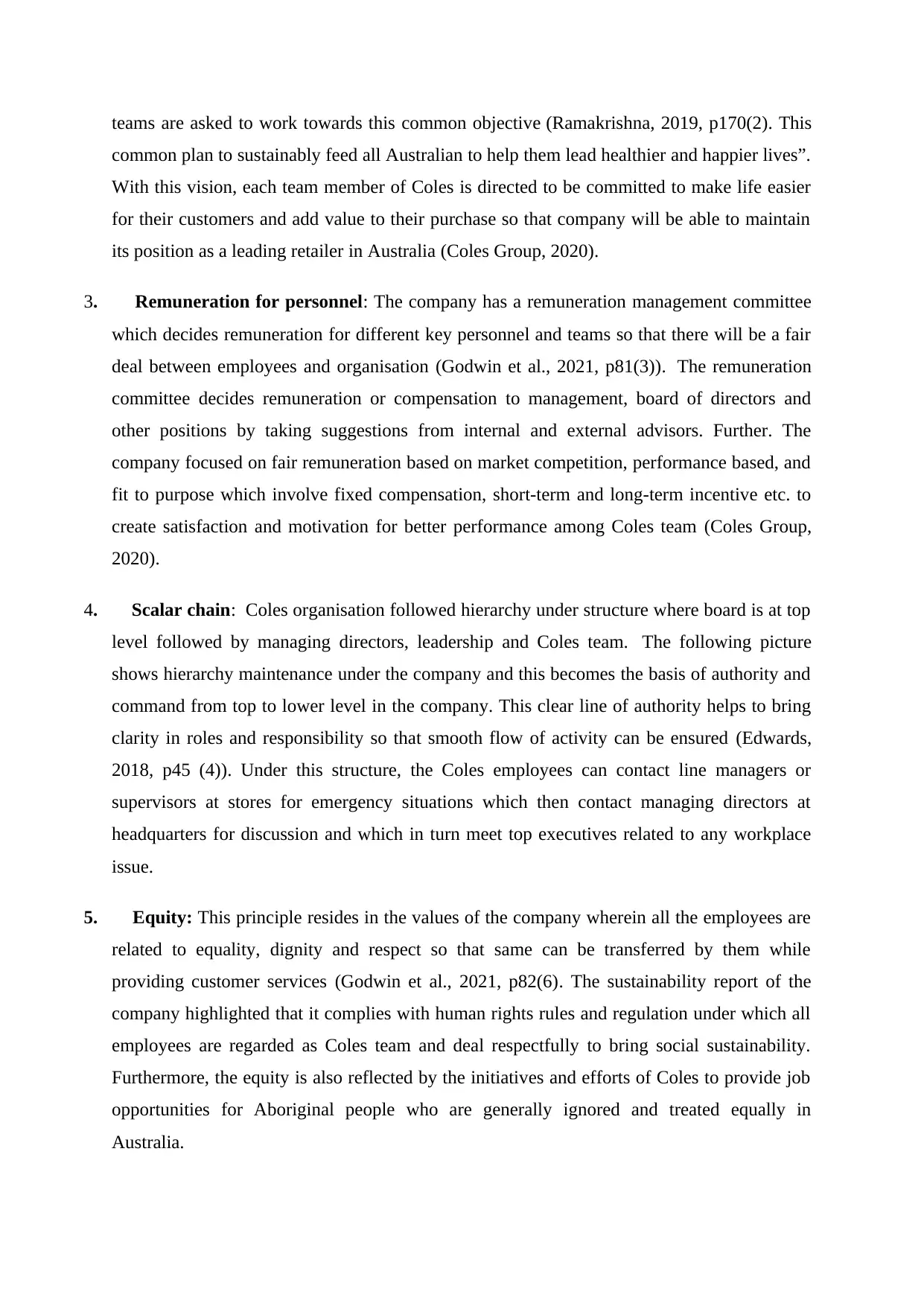
teams are asked to work towards this common objective (Ramakrishna, 2019, p170(2). This
common plan to sustainably feed all Australian to help them lead healthier and happier lives”.
With this vision, each team member of Coles is directed to be committed to make life easier
for their customers and add value to their purchase so that company will be able to maintain
its position as a leading retailer in Australia (Coles Group, 2020).
3. Remuneration for personnel: The company has a remuneration management committee
which decides remuneration for different key personnel and teams so that there will be a fair
deal between employees and organisation (Godwin et al., 2021, p81(3)). The remuneration
committee decides remuneration or compensation to management, board of directors and
other positions by taking suggestions from internal and external advisors. Further. The
company focused on fair remuneration based on market competition, performance based, and
fit to purpose which involve fixed compensation, short-term and long-term incentive etc. to
create satisfaction and motivation for better performance among Coles team (Coles Group,
2020).
4. Scalar chain: Coles organisation followed hierarchy under structure where board is at top
level followed by managing directors, leadership and Coles team. The following picture
shows hierarchy maintenance under the company and this becomes the basis of authority and
command from top to lower level in the company. This clear line of authority helps to bring
clarity in roles and responsibility so that smooth flow of activity can be ensured (Edwards,
2018, p45 (4)). Under this structure, the Coles employees can contact line managers or
supervisors at stores for emergency situations which then contact managing directors at
headquarters for discussion and which in turn meet top executives related to any workplace
issue.
5. Equity: This principle resides in the values of the company wherein all the employees are
related to equality, dignity and respect so that same can be transferred by them while
providing customer services (Godwin et al., 2021, p82(6). The sustainability report of the
company highlighted that it complies with human rights rules and regulation under which all
employees are regarded as Coles team and deal respectfully to bring social sustainability.
Furthermore, the equity is also reflected by the initiatives and efforts of Coles to provide job
opportunities for Aboriginal people who are generally ignored and treated equally in
Australia.
common plan to sustainably feed all Australian to help them lead healthier and happier lives”.
With this vision, each team member of Coles is directed to be committed to make life easier
for their customers and add value to their purchase so that company will be able to maintain
its position as a leading retailer in Australia (Coles Group, 2020).
3. Remuneration for personnel: The company has a remuneration management committee
which decides remuneration for different key personnel and teams so that there will be a fair
deal between employees and organisation (Godwin et al., 2021, p81(3)). The remuneration
committee decides remuneration or compensation to management, board of directors and
other positions by taking suggestions from internal and external advisors. Further. The
company focused on fair remuneration based on market competition, performance based, and
fit to purpose which involve fixed compensation, short-term and long-term incentive etc. to
create satisfaction and motivation for better performance among Coles team (Coles Group,
2020).
4. Scalar chain: Coles organisation followed hierarchy under structure where board is at top
level followed by managing directors, leadership and Coles team. The following picture
shows hierarchy maintenance under the company and this becomes the basis of authority and
command from top to lower level in the company. This clear line of authority helps to bring
clarity in roles and responsibility so that smooth flow of activity can be ensured (Edwards,
2018, p45 (4)). Under this structure, the Coles employees can contact line managers or
supervisors at stores for emergency situations which then contact managing directors at
headquarters for discussion and which in turn meet top executives related to any workplace
issue.
5. Equity: This principle resides in the values of the company wherein all the employees are
related to equality, dignity and respect so that same can be transferred by them while
providing customer services (Godwin et al., 2021, p82(6). The sustainability report of the
company highlighted that it complies with human rights rules and regulation under which all
employees are regarded as Coles team and deal respectfully to bring social sustainability.
Furthermore, the equity is also reflected by the initiatives and efforts of Coles to provide job
opportunities for Aboriginal people who are generally ignored and treated equally in
Australia.
⊘ This is a preview!⊘
Do you want full access?
Subscribe today to unlock all pages.

Trusted by 1+ million students worldwide
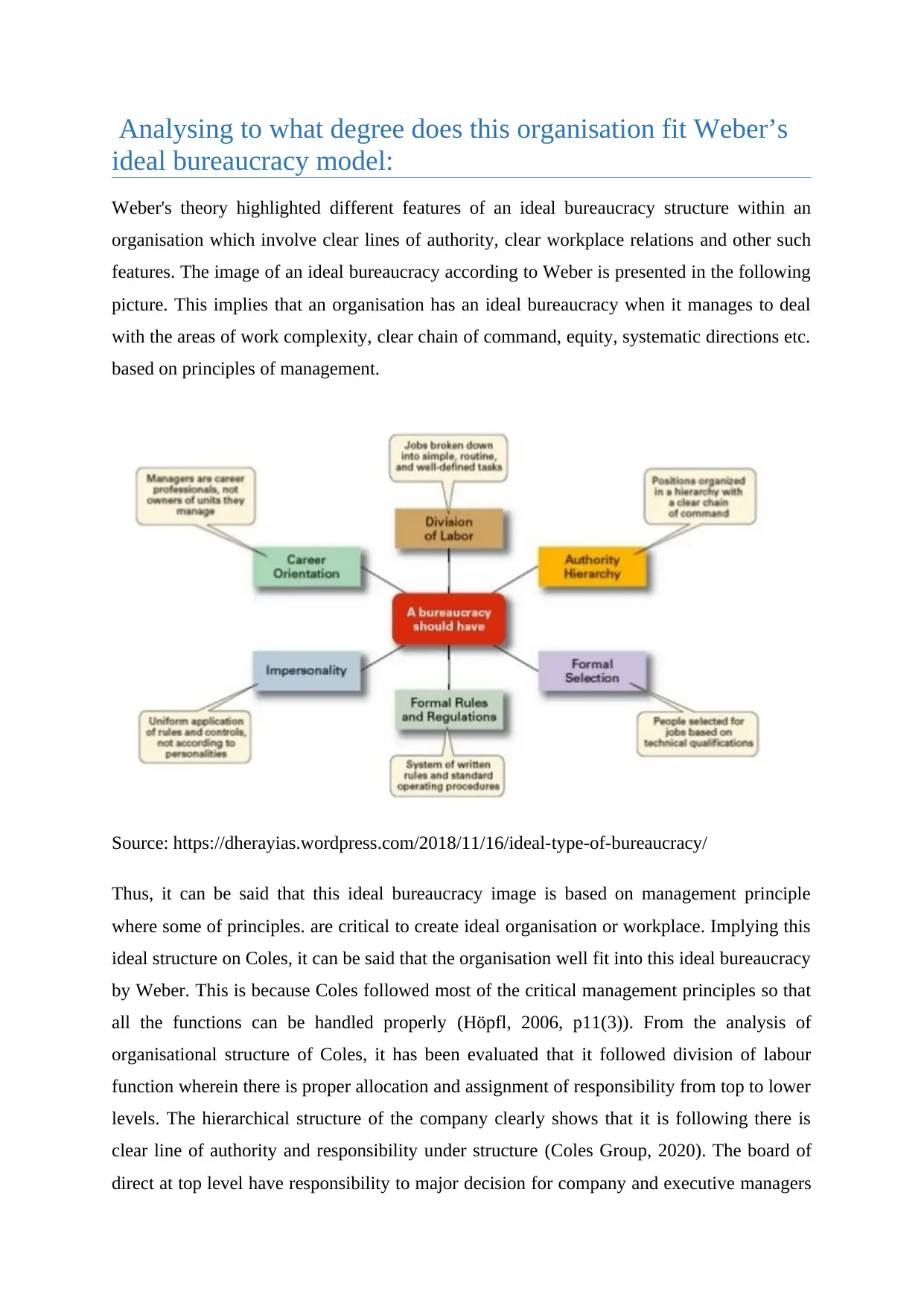
Analysing to what degree does this organisation fit Weber’s
ideal bureaucracy model:
Weber's theory highlighted different features of an ideal bureaucracy structure within an
organisation which involve clear lines of authority, clear workplace relations and other such
features. The image of an ideal bureaucracy according to Weber is presented in the following
picture. This implies that an organisation has an ideal bureaucracy when it manages to deal
with the areas of work complexity, clear chain of command, equity, systematic directions etc.
based on principles of management.
Source: https://dherayias.wordpress.com/2018/11/16/ideal-type-of-bureaucracy/
Thus, it can be said that this ideal bureaucracy image is based on management principle
where some of principles. are critical to create ideal organisation or workplace. Implying this
ideal structure on Coles, it can be said that the organisation well fit into this ideal bureaucracy
by Weber. This is because Coles followed most of the critical management principles so that
all the functions can be handled properly (Höpfl, 2006, p11(3)). From the analysis of
organisational structure of Coles, it has been evaluated that it followed division of labour
function wherein there is proper allocation and assignment of responsibility from top to lower
levels. The hierarchical structure of the company clearly shows that it is following there is
clear line of authority and responsibility under structure (Coles Group, 2020). The board of
direct at top level have responsibility to major decision for company and executive managers
ideal bureaucracy model:
Weber's theory highlighted different features of an ideal bureaucracy structure within an
organisation which involve clear lines of authority, clear workplace relations and other such
features. The image of an ideal bureaucracy according to Weber is presented in the following
picture. This implies that an organisation has an ideal bureaucracy when it manages to deal
with the areas of work complexity, clear chain of command, equity, systematic directions etc.
based on principles of management.
Source: https://dherayias.wordpress.com/2018/11/16/ideal-type-of-bureaucracy/
Thus, it can be said that this ideal bureaucracy image is based on management principle
where some of principles. are critical to create ideal organisation or workplace. Implying this
ideal structure on Coles, it can be said that the organisation well fit into this ideal bureaucracy
by Weber. This is because Coles followed most of the critical management principles so that
all the functions can be handled properly (Höpfl, 2006, p11(3)). From the analysis of
organisational structure of Coles, it has been evaluated that it followed division of labour
function wherein there is proper allocation and assignment of responsibility from top to lower
levels. The hierarchical structure of the company clearly shows that it is following there is
clear line of authority and responsibility under structure (Coles Group, 2020). The board of
direct at top level have responsibility to major decision for company and executive managers
Paraphrase This Document
Need a fresh take? Get an instant paraphrase of this document with our AI Paraphraser
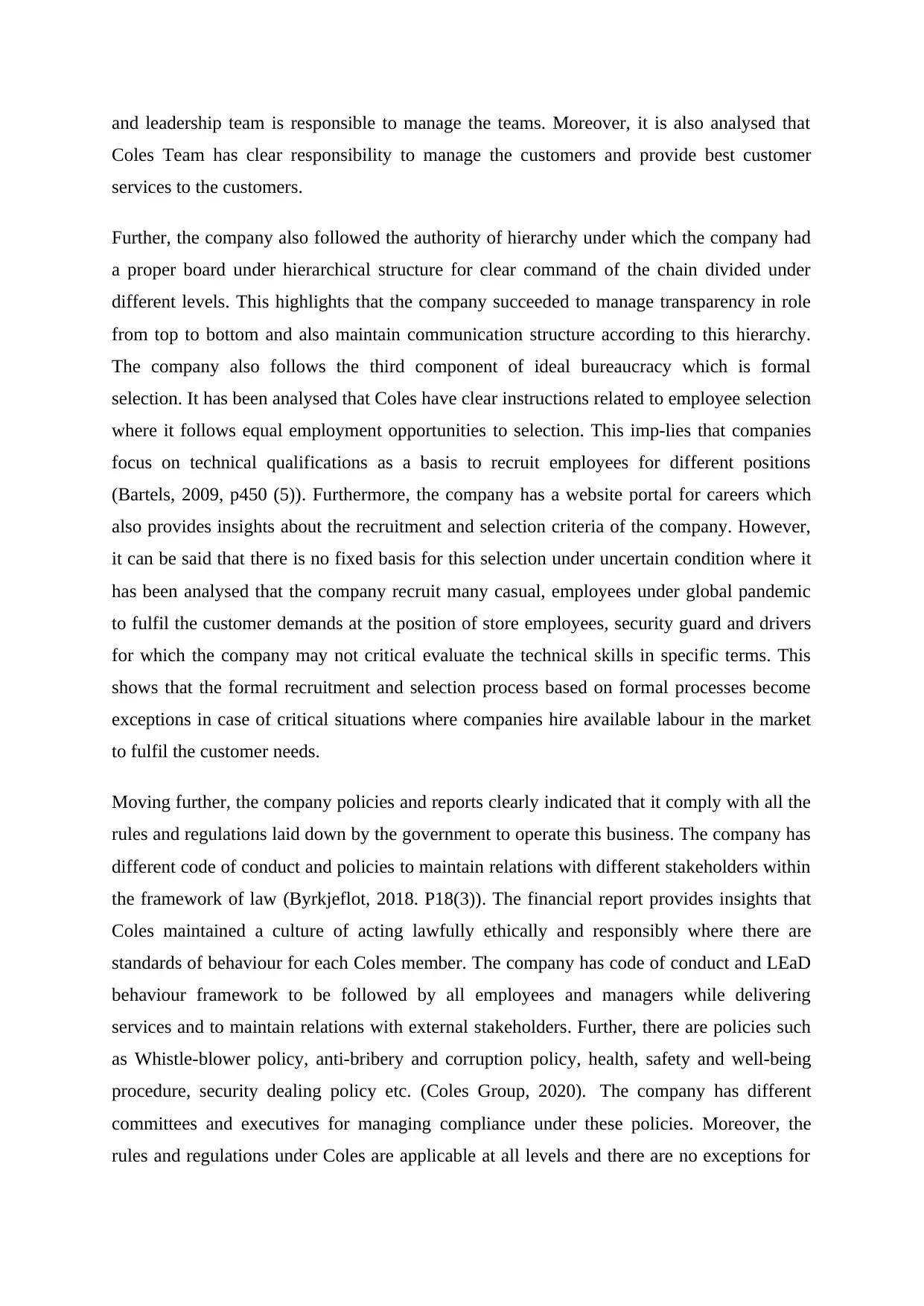
and leadership team is responsible to manage the teams. Moreover, it is also analysed that
Coles Team has clear responsibility to manage the customers and provide best customer
services to the customers.
Further, the company also followed the authority of hierarchy under which the company had
a proper board under hierarchical structure for clear command of the chain divided under
different levels. This highlights that the company succeeded to manage transparency in role
from top to bottom and also maintain communication structure according to this hierarchy.
The company also follows the third component of ideal bureaucracy which is formal
selection. It has been analysed that Coles have clear instructions related to employee selection
where it follows equal employment opportunities to selection. This imp-lies that companies
focus on technical qualifications as a basis to recruit employees for different positions
(Bartels, 2009, p450 (5)). Furthermore, the company has a website portal for careers which
also provides insights about the recruitment and selection criteria of the company. However,
it can be said that there is no fixed basis for this selection under uncertain condition where it
has been analysed that the company recruit many casual, employees under global pandemic
to fulfil the customer demands at the position of store employees, security guard and drivers
for which the company may not critical evaluate the technical skills in specific terms. This
shows that the formal recruitment and selection process based on formal processes become
exceptions in case of critical situations where companies hire available labour in the market
to fulfil the customer needs.
Moving further, the company policies and reports clearly indicated that it comply with all the
rules and regulations laid down by the government to operate this business. The company has
different code of conduct and policies to maintain relations with different stakeholders within
the framework of law (Byrkjeflot, 2018. P18(3)). The financial report provides insights that
Coles maintained a culture of acting lawfully ethically and responsibly where there are
standards of behaviour for each Coles member. The company has code of conduct and LEaD
behaviour framework to be followed by all employees and managers while delivering
services and to maintain relations with external stakeholders. Further, there are policies such
as Whistle-blower policy, anti-bribery and corruption policy, health, safety and well-being
procedure, security dealing policy etc. (Coles Group, 2020). The company has different
committees and executives for managing compliance under these policies. Moreover, the
rules and regulations under Coles are applicable at all levels and there are no exceptions for
Coles Team has clear responsibility to manage the customers and provide best customer
services to the customers.
Further, the company also followed the authority of hierarchy under which the company had
a proper board under hierarchical structure for clear command of the chain divided under
different levels. This highlights that the company succeeded to manage transparency in role
from top to bottom and also maintain communication structure according to this hierarchy.
The company also follows the third component of ideal bureaucracy which is formal
selection. It has been analysed that Coles have clear instructions related to employee selection
where it follows equal employment opportunities to selection. This imp-lies that companies
focus on technical qualifications as a basis to recruit employees for different positions
(Bartels, 2009, p450 (5)). Furthermore, the company has a website portal for careers which
also provides insights about the recruitment and selection criteria of the company. However,
it can be said that there is no fixed basis for this selection under uncertain condition where it
has been analysed that the company recruit many casual, employees under global pandemic
to fulfil the customer demands at the position of store employees, security guard and drivers
for which the company may not critical evaluate the technical skills in specific terms. This
shows that the formal recruitment and selection process based on formal processes become
exceptions in case of critical situations where companies hire available labour in the market
to fulfil the customer needs.
Moving further, the company policies and reports clearly indicated that it comply with all the
rules and regulations laid down by the government to operate this business. The company has
different code of conduct and policies to maintain relations with different stakeholders within
the framework of law (Byrkjeflot, 2018. P18(3)). The financial report provides insights that
Coles maintained a culture of acting lawfully ethically and responsibly where there are
standards of behaviour for each Coles member. The company has code of conduct and LEaD
behaviour framework to be followed by all employees and managers while delivering
services and to maintain relations with external stakeholders. Further, there are policies such
as Whistle-blower policy, anti-bribery and corruption policy, health, safety and well-being
procedure, security dealing policy etc. (Coles Group, 2020). The company has different
committees and executives for managing compliance under these policies. Moreover, the
rules and regulations under Coles are applicable at all levels and there are no exceptions for
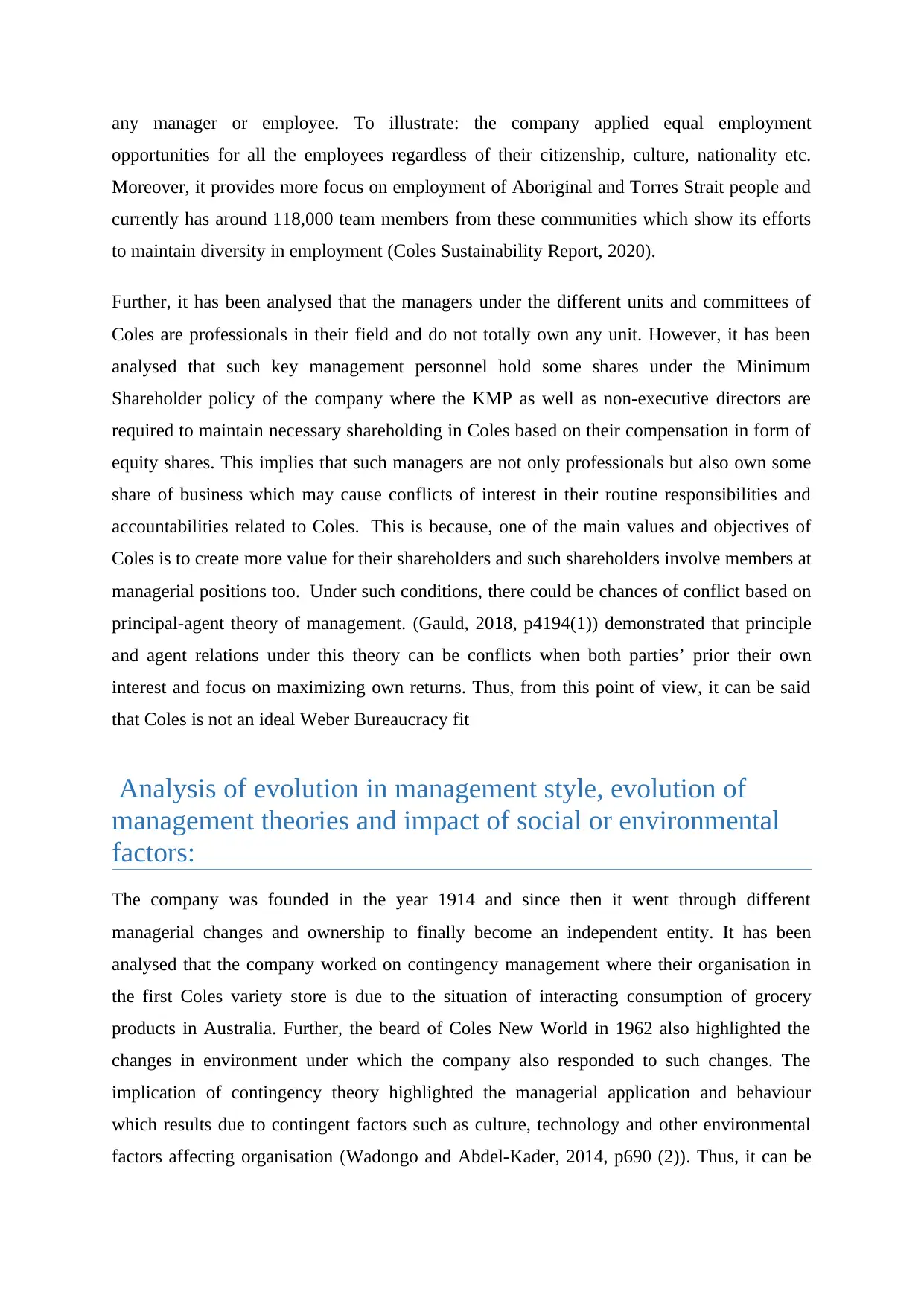
any manager or employee. To illustrate: the company applied equal employment
opportunities for all the employees regardless of their citizenship, culture, nationality etc.
Moreover, it provides more focus on employment of Aboriginal and Torres Strait people and
currently has around 118,000 team members from these communities which show its efforts
to maintain diversity in employment (Coles Sustainability Report, 2020).
Further, it has been analysed that the managers under the different units and committees of
Coles are professionals in their field and do not totally own any unit. However, it has been
analysed that such key management personnel hold some shares under the Minimum
Shareholder policy of the company where the KMP as well as non-executive directors are
required to maintain necessary shareholding in Coles based on their compensation in form of
equity shares. This implies that such managers are not only professionals but also own some
share of business which may cause conflicts of interest in their routine responsibilities and
accountabilities related to Coles. This is because, one of the main values and objectives of
Coles is to create more value for their shareholders and such shareholders involve members at
managerial positions too. Under such conditions, there could be chances of conflict based on
principal-agent theory of management. (Gauld, 2018, p4194(1)) demonstrated that principle
and agent relations under this theory can be conflicts when both parties’ prior their own
interest and focus on maximizing own returns. Thus, from this point of view, it can be said
that Coles is not an ideal Weber Bureaucracy fit
Analysis of evolution in management style, evolution of
management theories and impact of social or environmental
factors:
The company was founded in the year 1914 and since then it went through different
managerial changes and ownership to finally become an independent entity. It has been
analysed that the company worked on contingency management where their organisation in
the first Coles variety store is due to the situation of interacting consumption of grocery
products in Australia. Further, the beard of Coles New World in 1962 also highlighted the
changes in environment under which the company also responded to such changes. The
implication of contingency theory highlighted the managerial application and behaviour
which results due to contingent factors such as culture, technology and other environmental
factors affecting organisation (Wadongo and Abdel-Kader, 2014, p690 (2)). Thus, it can be
opportunities for all the employees regardless of their citizenship, culture, nationality etc.
Moreover, it provides more focus on employment of Aboriginal and Torres Strait people and
currently has around 118,000 team members from these communities which show its efforts
to maintain diversity in employment (Coles Sustainability Report, 2020).
Further, it has been analysed that the managers under the different units and committees of
Coles are professionals in their field and do not totally own any unit. However, it has been
analysed that such key management personnel hold some shares under the Minimum
Shareholder policy of the company where the KMP as well as non-executive directors are
required to maintain necessary shareholding in Coles based on their compensation in form of
equity shares. This implies that such managers are not only professionals but also own some
share of business which may cause conflicts of interest in their routine responsibilities and
accountabilities related to Coles. This is because, one of the main values and objectives of
Coles is to create more value for their shareholders and such shareholders involve members at
managerial positions too. Under such conditions, there could be chances of conflict based on
principal-agent theory of management. (Gauld, 2018, p4194(1)) demonstrated that principle
and agent relations under this theory can be conflicts when both parties’ prior their own
interest and focus on maximizing own returns. Thus, from this point of view, it can be said
that Coles is not an ideal Weber Bureaucracy fit
Analysis of evolution in management style, evolution of
management theories and impact of social or environmental
factors:
The company was founded in the year 1914 and since then it went through different
managerial changes and ownership to finally become an independent entity. It has been
analysed that the company worked on contingency management where their organisation in
the first Coles variety store is due to the situation of interacting consumption of grocery
products in Australia. Further, the beard of Coles New World in 1962 also highlighted the
changes in environment under which the company also responded to such changes. The
implication of contingency theory highlighted the managerial application and behaviour
which results due to contingent factors such as culture, technology and other environmental
factors affecting organisation (Wadongo and Abdel-Kader, 2014, p690 (2)). Thus, it can be
⊘ This is a preview!⊘
Do you want full access?
Subscribe today to unlock all pages.

Trusted by 1+ million students worldwide
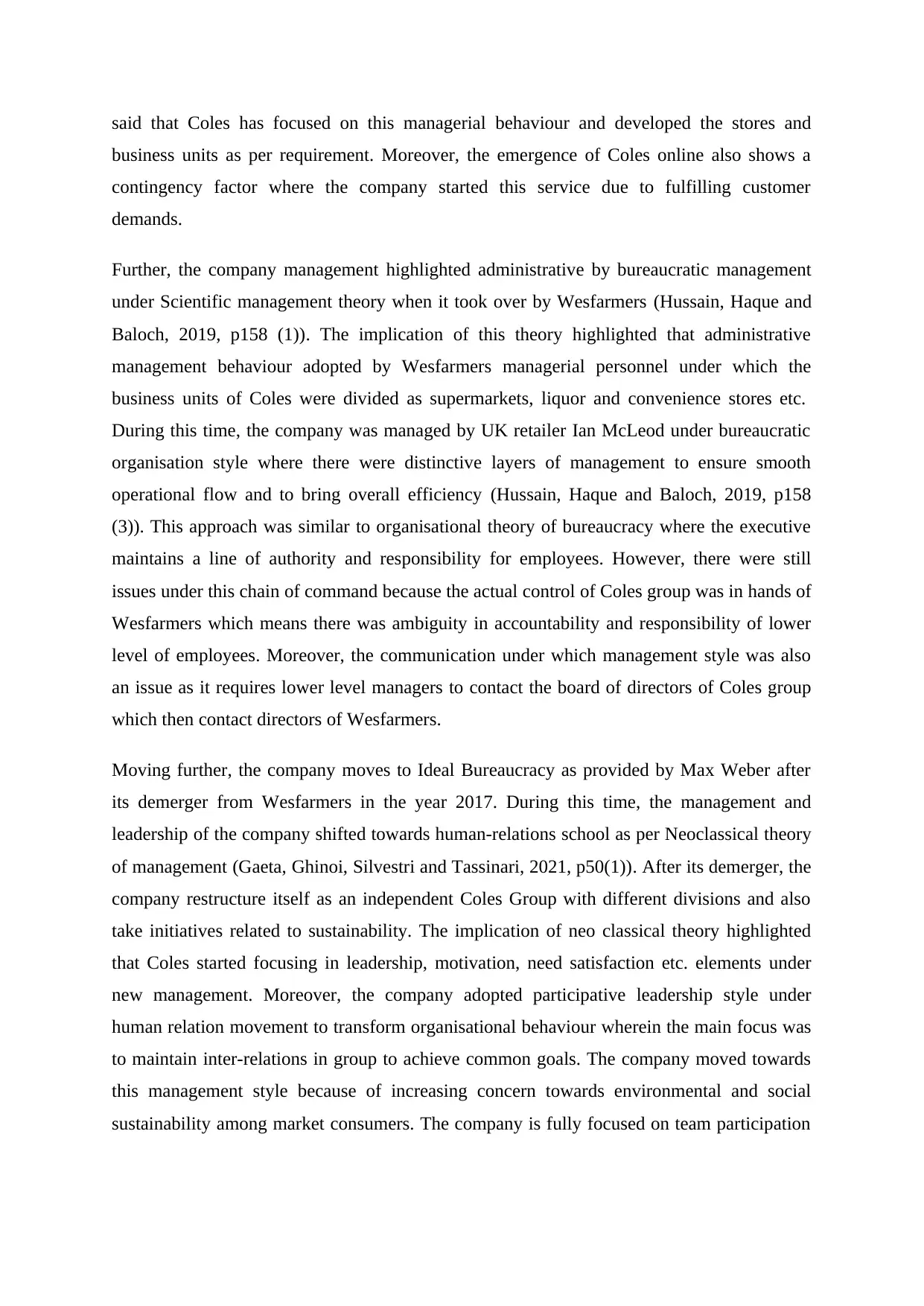
said that Coles has focused on this managerial behaviour and developed the stores and
business units as per requirement. Moreover, the emergence of Coles online also shows a
contingency factor where the company started this service due to fulfilling customer
demands.
Further, the company management highlighted administrative by bureaucratic management
under Scientific management theory when it took over by Wesfarmers (Hussain, Haque and
Baloch, 2019, p158 (1)). The implication of this theory highlighted that administrative
management behaviour adopted by Wesfarmers managerial personnel under which the
business units of Coles were divided as supermarkets, liquor and convenience stores etc.
During this time, the company was managed by UK retailer Ian McLeod under bureaucratic
organisation style where there were distinctive layers of management to ensure smooth
operational flow and to bring overall efficiency (Hussain, Haque and Baloch, 2019, p158
(3)). This approach was similar to organisational theory of bureaucracy where the executive
maintains a line of authority and responsibility for employees. However, there were still
issues under this chain of command because the actual control of Coles group was in hands of
Wesfarmers which means there was ambiguity in accountability and responsibility of lower
level of employees. Moreover, the communication under which management style was also
an issue as it requires lower level managers to contact the board of directors of Coles group
which then contact directors of Wesfarmers.
Moving further, the company moves to Ideal Bureaucracy as provided by Max Weber after
its demerger from Wesfarmers in the year 2017. During this time, the management and
leadership of the company shifted towards human-relations school as per Neoclassical theory
of management (Gaeta, Ghinoi, Silvestri and Tassinari, 2021, p50(1)). After its demerger, the
company restructure itself as an independent Coles Group with different divisions and also
take initiatives related to sustainability. The implication of neo classical theory highlighted
that Coles started focusing in leadership, motivation, need satisfaction etc. elements under
new management. Moreover, the company adopted participative leadership style under
human relation movement to transform organisational behaviour wherein the main focus was
to maintain inter-relations in group to achieve common goals. The company moved towards
this management style because of increasing concern towards environmental and social
sustainability among market consumers. The company is fully focused on team participation
business units as per requirement. Moreover, the emergence of Coles online also shows a
contingency factor where the company started this service due to fulfilling customer
demands.
Further, the company management highlighted administrative by bureaucratic management
under Scientific management theory when it took over by Wesfarmers (Hussain, Haque and
Baloch, 2019, p158 (1)). The implication of this theory highlighted that administrative
management behaviour adopted by Wesfarmers managerial personnel under which the
business units of Coles were divided as supermarkets, liquor and convenience stores etc.
During this time, the company was managed by UK retailer Ian McLeod under bureaucratic
organisation style where there were distinctive layers of management to ensure smooth
operational flow and to bring overall efficiency (Hussain, Haque and Baloch, 2019, p158
(3)). This approach was similar to organisational theory of bureaucracy where the executive
maintains a line of authority and responsibility for employees. However, there were still
issues under this chain of command because the actual control of Coles group was in hands of
Wesfarmers which means there was ambiguity in accountability and responsibility of lower
level of employees. Moreover, the communication under which management style was also
an issue as it requires lower level managers to contact the board of directors of Coles group
which then contact directors of Wesfarmers.
Moving further, the company moves to Ideal Bureaucracy as provided by Max Weber after
its demerger from Wesfarmers in the year 2017. During this time, the management and
leadership of the company shifted towards human-relations school as per Neoclassical theory
of management (Gaeta, Ghinoi, Silvestri and Tassinari, 2021, p50(1)). After its demerger, the
company restructure itself as an independent Coles Group with different divisions and also
take initiatives related to sustainability. The implication of neo classical theory highlighted
that Coles started focusing in leadership, motivation, need satisfaction etc. elements under
new management. Moreover, the company adopted participative leadership style under
human relation movement to transform organisational behaviour wherein the main focus was
to maintain inter-relations in group to achieve common goals. The company moved towards
this management style because of increasing concern towards environmental and social
sustainability among market consumers. The company is fully focused on team participation
Paraphrase This Document
Need a fresh take? Get an instant paraphrase of this document with our AI Paraphraser
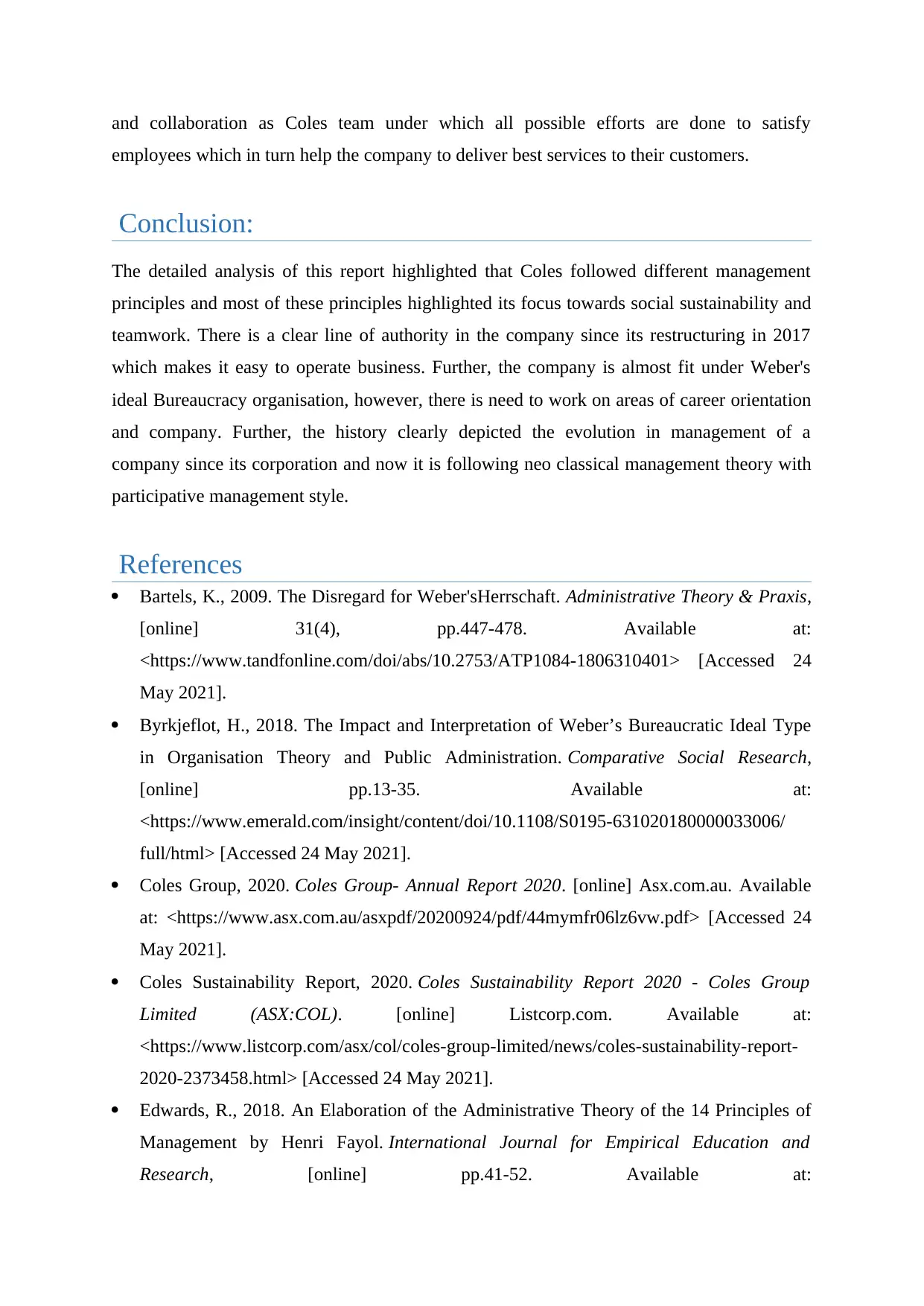
and collaboration as Coles team under which all possible efforts are done to satisfy
employees which in turn help the company to deliver best services to their customers.
Conclusion:
The detailed analysis of this report highlighted that Coles followed different management
principles and most of these principles highlighted its focus towards social sustainability and
teamwork. There is a clear line of authority in the company since its restructuring in 2017
which makes it easy to operate business. Further, the company is almost fit under Weber's
ideal Bureaucracy organisation, however, there is need to work on areas of career orientation
and company. Further, the history clearly depicted the evolution in management of a
company since its corporation and now it is following neo classical management theory with
participative management style.
References
Bartels, K., 2009. The Disregard for Weber'sHerrschaft. Administrative Theory & Praxis,
[online] 31(4), pp.447-478. Available at:
<https://www.tandfonline.com/doi/abs/10.2753/ATP1084-1806310401> [Accessed 24
May 2021].
Byrkjeflot, H., 2018. The Impact and Interpretation of Weber’s Bureaucratic Ideal Type
in Organisation Theory and Public Administration. Comparative Social Research,
[online] pp.13-35. Available at:
<https://www.emerald.com/insight/content/doi/10.1108/S0195-631020180000033006/
full/html> [Accessed 24 May 2021].
Coles Group, 2020. Coles Group- Annual Report 2020. [online] Asx.com.au. Available
at: <https://www.asx.com.au/asxpdf/20200924/pdf/44mymfr06lz6vw.pdf> [Accessed 24
May 2021].
Coles Sustainability Report, 2020. Coles Sustainability Report 2020 - Coles Group
Limited (ASX:COL). [online] Listcorp.com. Available at:
<https://www.listcorp.com/asx/col/coles-group-limited/news/coles-sustainability-report-
2020-2373458.html> [Accessed 24 May 2021].
Edwards, R., 2018. An Elaboration of the Administrative Theory of the 14 Principles of
Management by Henri Fayol. International Journal for Empirical Education and
Research, [online] pp.41-52. Available at:
employees which in turn help the company to deliver best services to their customers.
Conclusion:
The detailed analysis of this report highlighted that Coles followed different management
principles and most of these principles highlighted its focus towards social sustainability and
teamwork. There is a clear line of authority in the company since its restructuring in 2017
which makes it easy to operate business. Further, the company is almost fit under Weber's
ideal Bureaucracy organisation, however, there is need to work on areas of career orientation
and company. Further, the history clearly depicted the evolution in management of a
company since its corporation and now it is following neo classical management theory with
participative management style.
References
Bartels, K., 2009. The Disregard for Weber'sHerrschaft. Administrative Theory & Praxis,
[online] 31(4), pp.447-478. Available at:
<https://www.tandfonline.com/doi/abs/10.2753/ATP1084-1806310401> [Accessed 24
May 2021].
Byrkjeflot, H., 2018. The Impact and Interpretation of Weber’s Bureaucratic Ideal Type
in Organisation Theory and Public Administration. Comparative Social Research,
[online] pp.13-35. Available at:
<https://www.emerald.com/insight/content/doi/10.1108/S0195-631020180000033006/
full/html> [Accessed 24 May 2021].
Coles Group, 2020. Coles Group- Annual Report 2020. [online] Asx.com.au. Available
at: <https://www.asx.com.au/asxpdf/20200924/pdf/44mymfr06lz6vw.pdf> [Accessed 24
May 2021].
Coles Sustainability Report, 2020. Coles Sustainability Report 2020 - Coles Group
Limited (ASX:COL). [online] Listcorp.com. Available at:
<https://www.listcorp.com/asx/col/coles-group-limited/news/coles-sustainability-report-
2020-2373458.html> [Accessed 24 May 2021].
Edwards, R., 2018. An Elaboration of the Administrative Theory of the 14 Principles of
Management by Henri Fayol. International Journal for Empirical Education and
Research, [online] pp.41-52. Available at:
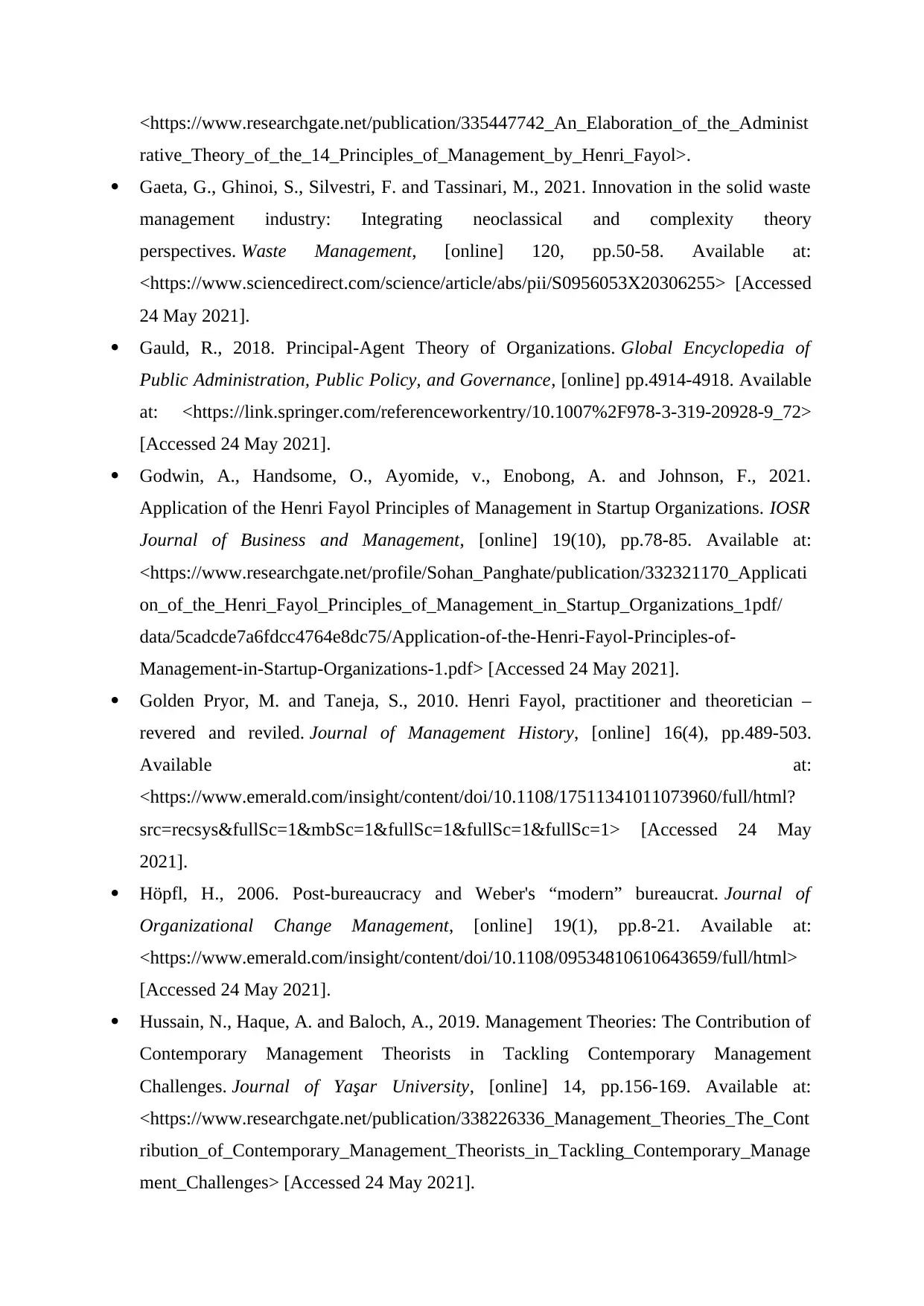
<https://www.researchgate.net/publication/335447742_An_Elaboration_of_the_Administ
rative_Theory_of_the_14_Principles_of_Management_by_Henri_Fayol>.
Gaeta, G., Ghinoi, S., Silvestri, F. and Tassinari, M., 2021. Innovation in the solid waste
management industry: Integrating neoclassical and complexity theory
perspectives. Waste Management, [online] 120, pp.50-58. Available at:
<https://www.sciencedirect.com/science/article/abs/pii/S0956053X20306255> [Accessed
24 May 2021].
Gauld, R., 2018. Principal-Agent Theory of Organizations. Global Encyclopedia of
Public Administration, Public Policy, and Governance, [online] pp.4914-4918. Available
at: <https://link.springer.com/referenceworkentry/10.1007%2F978-3-319-20928-9_72>
[Accessed 24 May 2021].
Godwin, A., Handsome, O., Ayomide, v., Enobong, A. and Johnson, F., 2021.
Application of the Henri Fayol Principles of Management in Startup Organizations. IOSR
Journal of Business and Management, [online] 19(10), pp.78-85. Available at:
<https://www.researchgate.net/profile/Sohan_Panghate/publication/332321170_Applicati
on_of_the_Henri_Fayol_Principles_of_Management_in_Startup_Organizations_1pdf/
data/5cadcde7a6fdcc4764e8dc75/Application-of-the-Henri-Fayol-Principles-of-
Management-in-Startup-Organizations-1.pdf> [Accessed 24 May 2021].
Golden Pryor, M. and Taneja, S., 2010. Henri Fayol, practitioner and theoretician –
revered and reviled. Journal of Management History, [online] 16(4), pp.489-503.
Available at:
<https://www.emerald.com/insight/content/doi/10.1108/17511341011073960/full/html?
src=recsys&fullSc=1&mbSc=1&fullSc=1&fullSc=1&fullSc=1> [Accessed 24 May
2021].
Höpfl, H., 2006. Post‐bureaucracy and Weber's “modern” bureaucrat. Journal of
Organizational Change Management, [online] 19(1), pp.8-21. Available at:
<https://www.emerald.com/insight/content/doi/10.1108/09534810610643659/full/html>
[Accessed 24 May 2021].
Hussain, N., Haque, A. and Baloch, A., 2019. Management Theories: The Contribution of
Contemporary Management Theorists in Tackling Contemporary Management
Challenges. Journal of Yaşar University, [online] 14, pp.156-169. Available at:
<https://www.researchgate.net/publication/338226336_Management_Theories_The_Cont
ribution_of_Contemporary_Management_Theorists_in_Tackling_Contemporary_Manage
ment_Challenges> [Accessed 24 May 2021].
rative_Theory_of_the_14_Principles_of_Management_by_Henri_Fayol>.
Gaeta, G., Ghinoi, S., Silvestri, F. and Tassinari, M., 2021. Innovation in the solid waste
management industry: Integrating neoclassical and complexity theory
perspectives. Waste Management, [online] 120, pp.50-58. Available at:
<https://www.sciencedirect.com/science/article/abs/pii/S0956053X20306255> [Accessed
24 May 2021].
Gauld, R., 2018. Principal-Agent Theory of Organizations. Global Encyclopedia of
Public Administration, Public Policy, and Governance, [online] pp.4914-4918. Available
at: <https://link.springer.com/referenceworkentry/10.1007%2F978-3-319-20928-9_72>
[Accessed 24 May 2021].
Godwin, A., Handsome, O., Ayomide, v., Enobong, A. and Johnson, F., 2021.
Application of the Henri Fayol Principles of Management in Startup Organizations. IOSR
Journal of Business and Management, [online] 19(10), pp.78-85. Available at:
<https://www.researchgate.net/profile/Sohan_Panghate/publication/332321170_Applicati
on_of_the_Henri_Fayol_Principles_of_Management_in_Startup_Organizations_1pdf/
data/5cadcde7a6fdcc4764e8dc75/Application-of-the-Henri-Fayol-Principles-of-
Management-in-Startup-Organizations-1.pdf> [Accessed 24 May 2021].
Golden Pryor, M. and Taneja, S., 2010. Henri Fayol, practitioner and theoretician –
revered and reviled. Journal of Management History, [online] 16(4), pp.489-503.
Available at:
<https://www.emerald.com/insight/content/doi/10.1108/17511341011073960/full/html?
src=recsys&fullSc=1&mbSc=1&fullSc=1&fullSc=1&fullSc=1> [Accessed 24 May
2021].
Höpfl, H., 2006. Post‐bureaucracy and Weber's “modern” bureaucrat. Journal of
Organizational Change Management, [online] 19(1), pp.8-21. Available at:
<https://www.emerald.com/insight/content/doi/10.1108/09534810610643659/full/html>
[Accessed 24 May 2021].
Hussain, N., Haque, A. and Baloch, A., 2019. Management Theories: The Contribution of
Contemporary Management Theorists in Tackling Contemporary Management
Challenges. Journal of Yaşar University, [online] 14, pp.156-169. Available at:
<https://www.researchgate.net/publication/338226336_Management_Theories_The_Cont
ribution_of_Contemporary_Management_Theorists_in_Tackling_Contemporary_Manage
ment_Challenges> [Accessed 24 May 2021].
⊘ This is a preview!⊘
Do you want full access?
Subscribe today to unlock all pages.

Trusted by 1+ million students worldwide
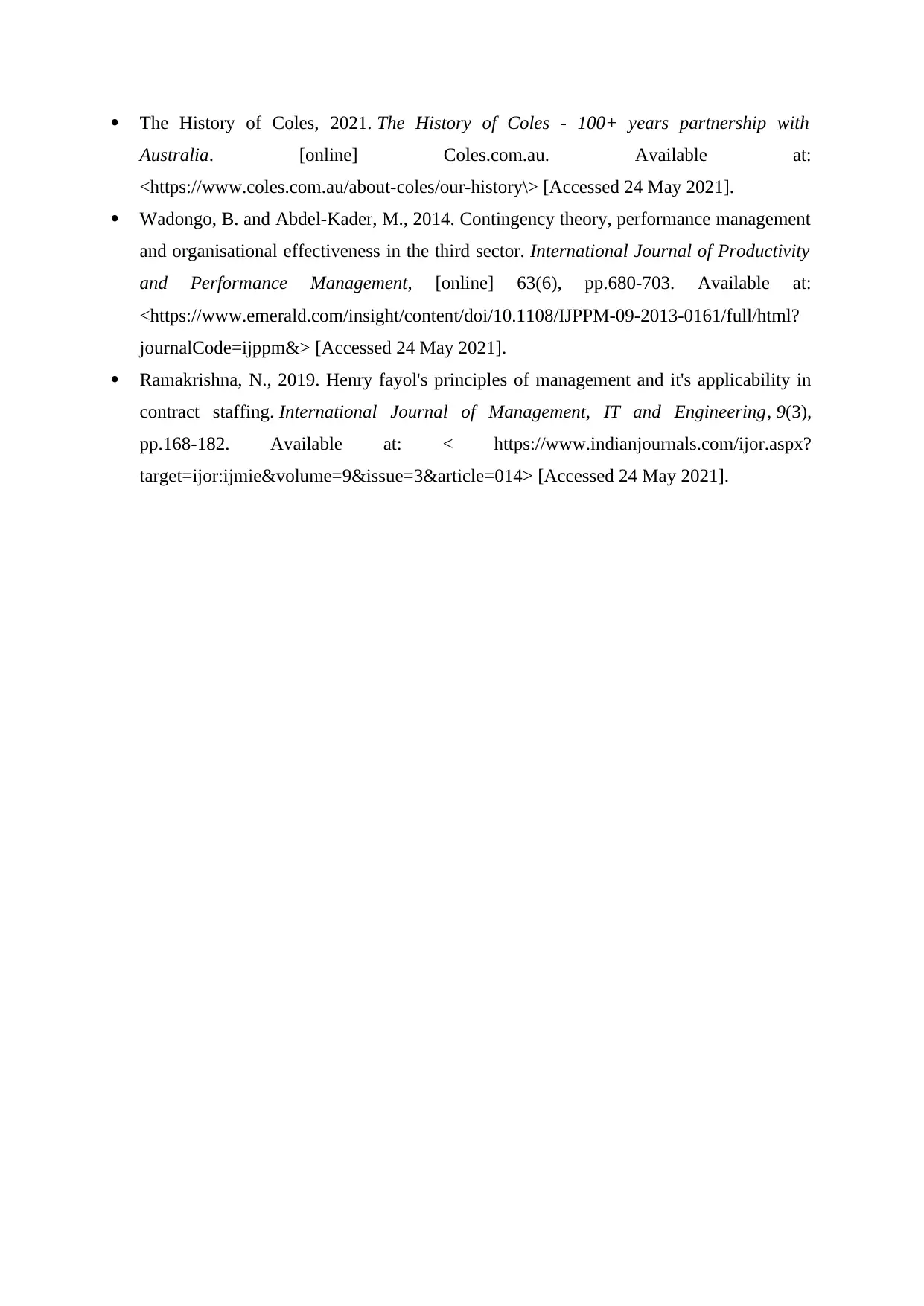
The History of Coles, 2021. The History of Coles - 100+ years partnership with
Australia. [online] Coles.com.au. Available at:
<https://www.coles.com.au/about-coles/our-history\> [Accessed 24 May 2021].
Wadongo, B. and Abdel-Kader, M., 2014. Contingency theory, performance management
and organisational effectiveness in the third sector. International Journal of Productivity
and Performance Management, [online] 63(6), pp.680-703. Available at:
<https://www.emerald.com/insight/content/doi/10.1108/IJPPM-09-2013-0161/full/html?
journalCode=ijppm&> [Accessed 24 May 2021].
Ramakrishna, N., 2019. Henry fayol's principles of management and it's applicability in
contract staffing. International Journal of Management, IT and Engineering, 9(3),
pp.168-182. Available at: < https://www.indianjournals.com/ijor.aspx?
target=ijor:ijmie&volume=9&issue=3&article=014> [Accessed 24 May 2021].
Australia. [online] Coles.com.au. Available at:
<https://www.coles.com.au/about-coles/our-history\> [Accessed 24 May 2021].
Wadongo, B. and Abdel-Kader, M., 2014. Contingency theory, performance management
and organisational effectiveness in the third sector. International Journal of Productivity
and Performance Management, [online] 63(6), pp.680-703. Available at:
<https://www.emerald.com/insight/content/doi/10.1108/IJPPM-09-2013-0161/full/html?
journalCode=ijppm&> [Accessed 24 May 2021].
Ramakrishna, N., 2019. Henry fayol's principles of management and it's applicability in
contract staffing. International Journal of Management, IT and Engineering, 9(3),
pp.168-182. Available at: < https://www.indianjournals.com/ijor.aspx?
target=ijor:ijmie&volume=9&issue=3&article=014> [Accessed 24 May 2021].
1 out of 10
Related Documents
Your All-in-One AI-Powered Toolkit for Academic Success.
+13062052269
info@desklib.com
Available 24*7 on WhatsApp / Email
![[object Object]](/_next/static/media/star-bottom.7253800d.svg)
Unlock your academic potential
Copyright © 2020–2026 A2Z Services. All Rights Reserved. Developed and managed by ZUCOL.





